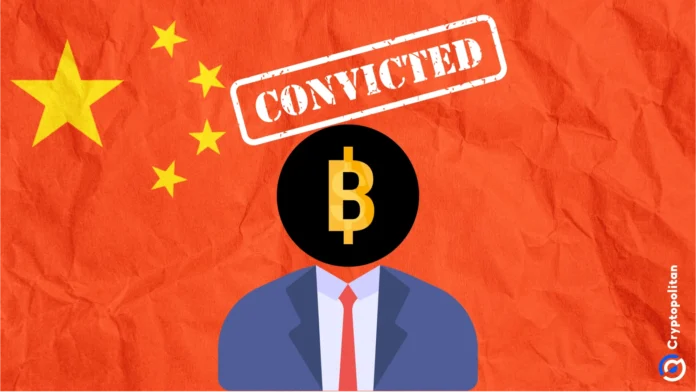Jai Hamid
Wang Moumou—a name no one had heard outside his government unit—is now infamous across China. Here was a guy who was once the perfect poster boy for a public official – hardworking, trusted, and supposedly untouchable.
However, a few terrible decisions brought him down. He gambled in the world of crypto, trying to turn his modest earnings into something more. Yet, those dreams of quick wealth came crashing down, leaving him buried under massive debts. And that’s when the story really gets interesting.
Faced with financial ruin, Wang did what most would never dream of. He took to the internet in search of an unconventional side gig. Desperate, he openly posted on a forum, stating he worked in a confidential government unit and needed extra cash. That’s like waving a red flag to a bull, but instead of a bull, it was foreign spies who came running.
Selling secrets for crypto: How Wang lost everything
Wang’s post caught the attention of a foreign agent, who slid into his messages with an offer he couldn’t ignore. “Paid information,” they called it, with “considerable compensation” attached. All he had to do was spill a few secrets. Simple, right? At first, Wang hesitated. But that was only for a short moment—debts can be powerful motivators.
He cracked. What started as a trickle of information quickly turned into a flood. The foreign agents wanted every last drop, and Wang was more than willing to oblige. A few photos here, some documents there, and suddenly, he was raking in money, all funneled into his crypto wallets.
By the time the Chinese National Security Agency caught on, Wang had passed on critical, top-secret information and made over a million yuan from his espionage side hustle. The People’s Court didn’t think twice: they threw the book at him. Life in prison, his political rights gone forever.
Security failures: Loopholes and lax management
Here’s where it gets embarrassing for Wang’s department. You’d think a place handling state secrets would have some sort of ironclad security system. Nope. The confidentiality measures? Practically non-existent. According to regulations, anyone handling classified documents should follow rigorous steps—registering, counting, and signing off.
None of that happened. Wang’s supervisors handed him sensitive files like it was no big deal. No tracking, no accountability. When the agency finally did an audit on Wang’s workstation, they found classified files lying around like discarded wrappers. It was amateur hour at its finest.
And this was all it took for Wang to pull off his espionage operation. The National Security Agency didn’t take it lightly. They’ve since ordered Wang’s unit to make some serious changes to avoid another embarrassing breach.
Trapped by foreign influence and blackmail
For foreign intelligence agencies, getting insiders in China is a goldmine, and they know exactly how to get their claws into officials like Wang. Once Wang started cooperating, he became their pawn.
And when he tried to cut ties, thinking he could walk away, the agents tightened their grip. They hit him with threats, harassment, and pressure, warning him they’d blow his cover if he stopped cooperating.
At that point, Wang was stuck. He had already gone too far, with no way out. The foreign agents knew they had him trapped, and they weren’t going to let him off easy. One favor turned into another, and soon he was too deep to back out.
China’s Criminal Law is crystal clear: anyone caught playing spy games for foreign agencies is looking at a minimum of ten years, but life in prison isn’t off the table.
The same goes for anyone caught handling state secrets recklessly. The government demands agencies take full responsibility for guarding their secrets.
Trump’s win and China’s excited crypto community
While Wang’s story unfolded, Donald Trump, the pro-Bitcoin guy, was winning the US presidential election. And if there’s one thing Trump is known for these days, it’s his love for digital currency.
Crypto enthusiasts in China? They’re thrilled. For them, Trump’s victory could mean bigger opportunities for Bitcoin and other cryptos.
Livio Weng, CEO of Hong Kong-based HashKey Exchange, put it bluntly: “Trump’s stance could breathe new life into the US crypto industry, and maybe Hong Kong will ease up on crypto policies too.”
Hong Kong is trying to position itself as a global Web3 hub, but Trump’s victory in the US could push the city to move even faster.
Despite China’s hardline stance on crypto, cracks are starting to show. Hong Kong, meanwhile, has three exchange-traded funds (ETFs) directly investing in Bitcoin, with HK$97.69 million changing hands recently. That’s the biggest volume in over a month. Over in the US, spot crypto ETFs are blowing up, stealing the spotlight and showing Hong Kong regulators they might need to pick up the pace.
China’s ban has been forcing most crypto ventures out of the country, a move that observers don’t consider smart. A professor from the Hong Kong University of Science and Technology recently called it “unwise” to ban crypto mining in China. He pointed out the obvious: pushing businesses abroad is only boosting tax revenues in the US.
Hong Kong’s regulators know they’ll need to accelerate crypto approvals to stay in the game. Weng from HashKey Exchange noted back in August that Hong Kong might feel the need to “speed up” its regulatory moves. As for mainland China, the question remains whether it’ll soften its bans or keep pushing crypto out.
Meanwhile, yesterday, Trump’s plans for a national Bitcoin reserve, along with all the other promises he made to the crypto community went viral in Chinese media across the country.
